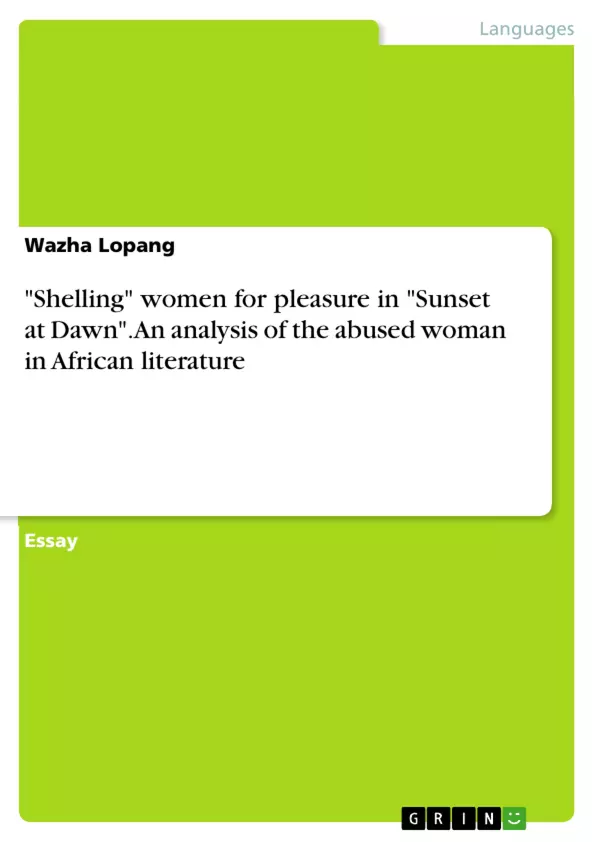The African continent is synonymous with war and women are caught up in it in the perpetual role of the victim. African literature in the pre colonial and colonial period has tended to be very intransigent in its portrayal of females in times of conflict. The African writer has created a fragmented female. This character is often bartered, manipulated or presented as lovesick in conflict situations creating a flawed and destructive image of the African woman. I argue that writers of African literature exposing the violent conflict of colonialism and liberation have a pessimistic outlook on the role of women in war which has hindered the empowerment of women. I will use Psychoanalysis and its concept on the life and death instincts to account for why sex and identity dominates the portrayal of women in pre-colonial and colonial literature. African writers have created a situation where conflict necessitates a sexual definition of the female character. Women thus possess a paradoxical identity of being sensual and consuming of the male phallus which ultimately breaks and consumes them. The conflict resolution is such that sex seems to logically place and displace ideas of sexuality and its impact on the female character.
Inhaltsverzeichnis (Table of Contents)
- Abstract
- Introduction: African Literature and the abused woman
- Freud's concept of Eros and Thanatos
- Eros and Thanatos in Sunset at Dawn
- Conclusion
Zielsetzung und Themenschwerpunkte (Objectives and Key Themes)
This essay examines the portrayal of women in African literature during the pre-colonial and colonial periods, specifically focusing on the impact of war on their representation. It argues that African writers often depict women as sexual objects, highlighting a pessimistic outlook on their role in conflict and hindering their empowerment. The essay utilizes Freudian psychoanalysis, particularly the concepts of Eros and Thanatos, to analyze how sex and identity dominate the depiction of women in these works.
- The impact of war on the portrayal of women in African literature
- The relationship between sex and identity in conflict situations
- The use of Freudian psychoanalysis to analyze the portrayal of women
- The role of colonialism and its influence on the representation of women
- The significance of female writers and their perspectives on war
Zusammenfassung der Kapitel (Chapter Summaries)
- Introduction: African Literature and the abused woman: This chapter explores the problematic portrayal of women in African literature during periods of conflict, arguing that they are often reduced to sexual incentives rather than protagonists of liberation. The chapter uses Kant's philosophy to highlight the moral implications of this representation and discusses the lack of female voices in narratives about war.
- Freud's concept of Eros and Thanatos: This chapter introduces Freud's controversial concept of Eros and Thanatos, the life and death instincts. It explains how these instincts are intertwined and how they manifest in various forms, including violence, self-destruction, and procreation. The chapter sets the stage for applying this theory to the analysis of women's portrayal in African literature.
- Eros and Thanatos in Sunset at Dawn: This chapter focuses on Chukwuemeka Ike's novel, Sunset at Dawn, to analyze how the themes of Eros and Thanatos play out in the context of the Biafran War. It examines how the novel portrays women as sexual objects, readily available for the male characters' gratification, and how this representation reinforces the connection between sex and violence in war. The chapter explores how this portrayal reflects a patriarchal perspective and the lack of agency given to female characters.
Schlüsselwörter (Keywords)
The key terms and concepts explored in this essay include: war, sexuality, death and life instincts, colonial African literature, psychoanalysis, female characters, representation, empowerment, and the Biafran War.
Frequently Asked Questions
How are women typically portrayed in pre-colonial African war literature?
They are often portrayed in the role of the victim, reduced to sexual incentives, or presented as fragmented characters who are bartered and manipulated.
What is the significance of Freud's Eros and Thanatos in this analysis?
The essay uses Freud's concepts of the life (Eros) and death (Thanatos) instincts to explain why sex and violence dominate the portrayal of women in conflict situations.
Which novel is specifically analyzed in this essay?
The essay focuses on Chukwuemeka Ike's novel "Sunset at Dawn," which is set during the Biafran War.
Why does the author argue that this portrayal hinders empowerment?
The pessimistic outlook on women's roles in war, where they lack agency and are defined only through their sexuality, prevents a more constructive and empowered image of African women from emerging.
Does the essay mention female writers?
Yes, it notes the importance of female perspectives and the general lack of female voices in traditional narratives about war and liberation.
- Quote paper
- Wazha Lopang (Author), 2017, "Shelling" women for pleasure in "Sunset at Dawn". An analysis of the abused woman in African literature, Munich, GRIN Verlag, https://www.grin.com/document/374773



